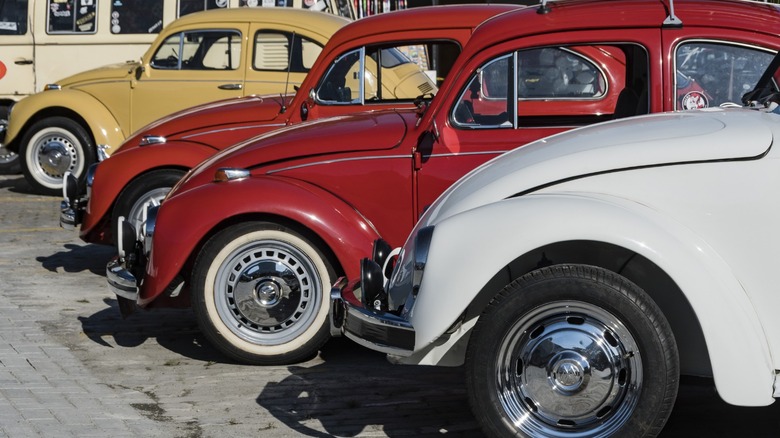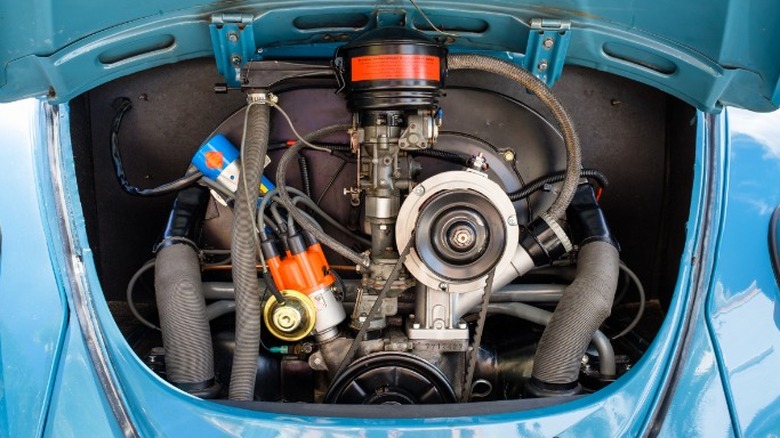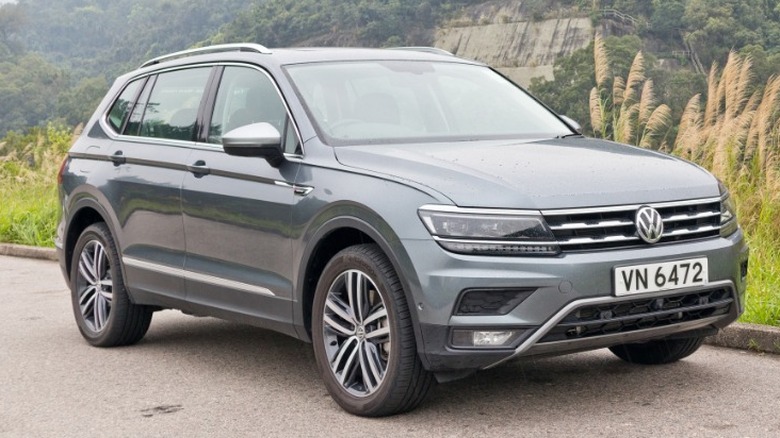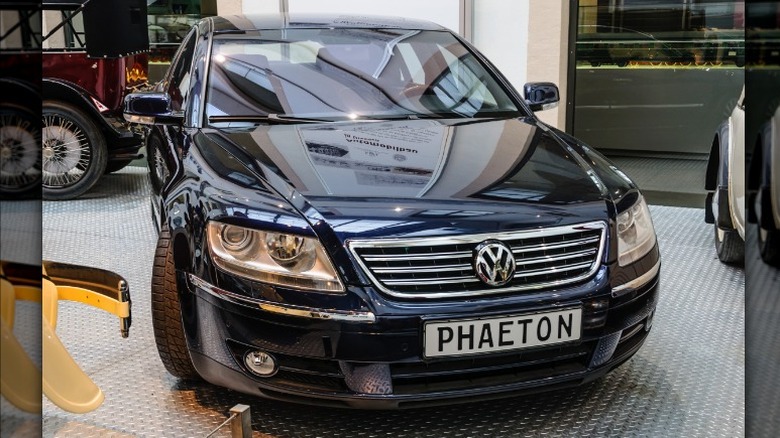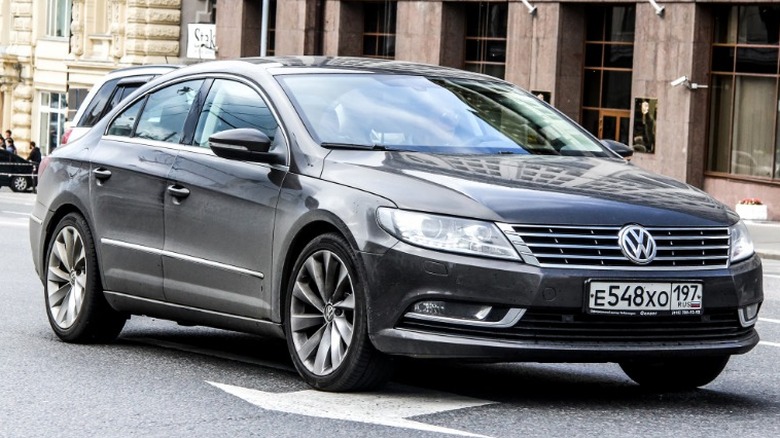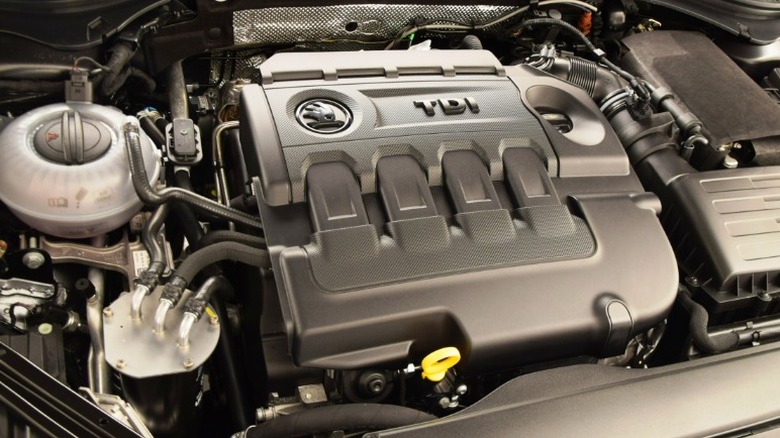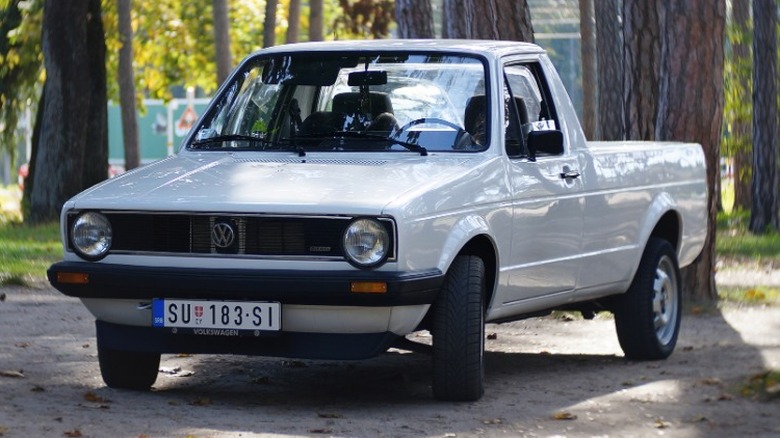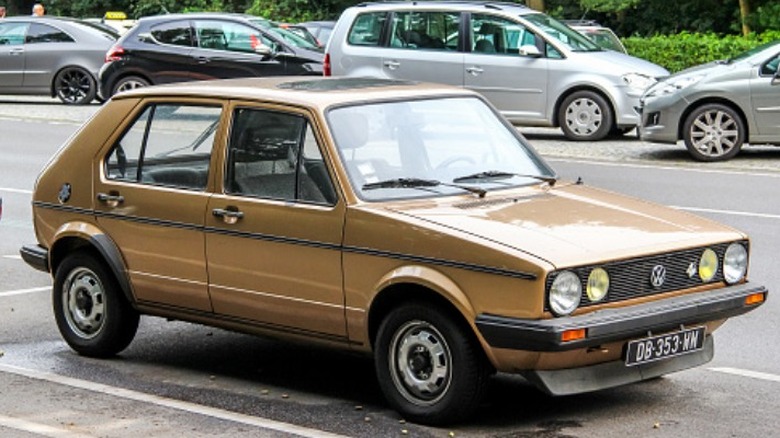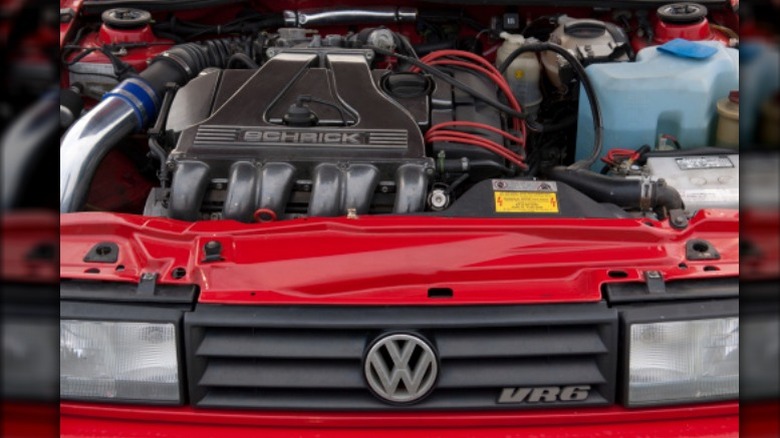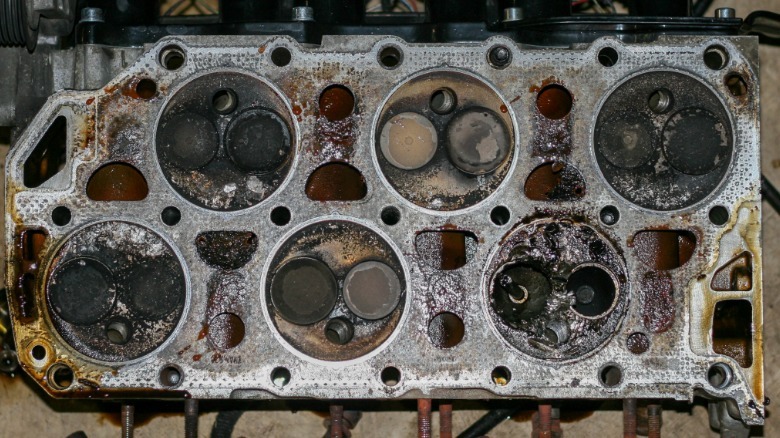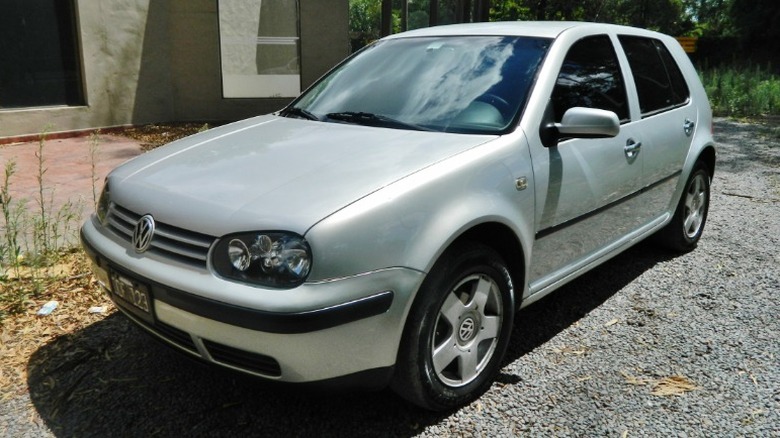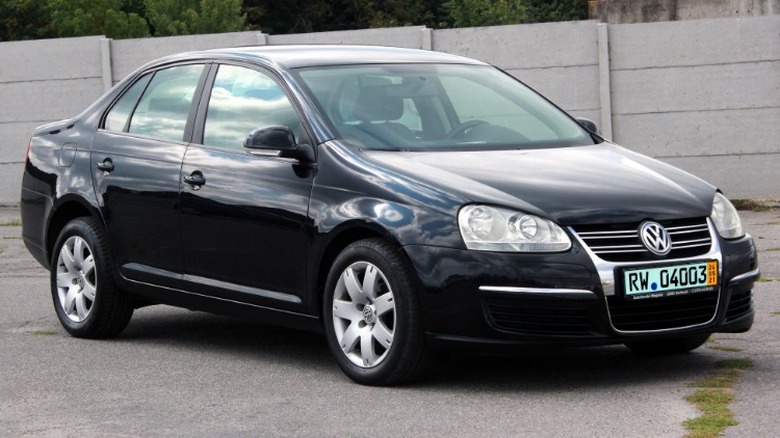The Most Reliable Engines Ever Built By Volkswagen, Ranked
Volkswagen products can be found in nearly any country around the world. Its simple and stylish VW logo is ubiquitous and iconic, often adopted as a fashion accessory in a way that goes even beyond the automotive industry. Despite its role as a pop culture fixture and its dominant role in mass marketing, VW is a car company that produces self-propelled machines for the masses. VW sits among the top makers within the industry's hierarchy with a portfolio of brands spanning every market segment built atop a long and storied history.
The cars produced by VW are all equipped with engines also produced by the company. While just a handful of engine variations drove the company to success in its early days, the offerings have since diversified significantly and today's VW offers a full range of gasoline and diesel varieties from small and efficient models for compact vehicles to those produced for large trucks and buses. VW has also produced many high-performance engines over the years while putting significant effort toward turbo technology starting in the late '90s. Throughout its history, VW has been known both for making ultra-reliable and robust vehicles as well as problematic and finicky models. While no company can hit it out of the park every single time, VW has made many excellent products, and these particular engines from the manufacturer are known to be the most reliable, listed from good to best.
10. Air-cooled boxer
From its introduction in the '30s until its demise in 2003 — sales ended in the U.S. in 1979 but continued in Mexico for many more years — the original VW Type 1 Beetle was powered by a 4-cylinder horizontally opposed piston engine, more commonly known as a "boxer". Part of the success and longevity of the Beetle was the engine and the sheer simplicity of it that kept cars going long past their prime.
The original design of the engine came about as a result of a directive by a now-defunct German government to produce a car for the people. The engine lacks a cooling system and was installed in cars without power steering or air conditioning, and it's bolted directly to the gearbox to make one complete system residing in the rear of the car. With just eight valves and no overhead cams, service remains simple.
The caveat to a reliable VW boxer is maintenance. The Boxer lacks the refinement of modern manufacturing and electronic controls, but, as long as it receives regular attention, an air-cooled VW can go for years with only minor service needs. And when they do need repair, it can be done cheaply and easily. The Guinness world record for removing and replacing the engine of a Beetle with no power tools is currently just one minute and four seconds.
9. 2.0-liter EA113 TSI
Modern engines come with a lengthy list of technological improvements, giving them much greater efficiency and higher power ratings over their predecessors. While these gains are welcome, they often come with complexity that can make reliability suffer. The VW 2.0 TSI is packed with modern components but remains mostly dependable.
The EA113 2.0 TSI is a 4-cylinder engine featuring 16 valves driven by two camshafts with variable valve timing, and fuel is delivered via direct injection. It's installed on a broad range of vehicles across the Volkswagen Group, including VW, Audi, Skoda, and Seat. The valve train is belt driven, which is a potential weak point if maintenance is not kept up and the belt isn't changed around 90,000 miles. The other common issue is carbon deposits within the induction system. This is a common problem with direct injection as fuel typically cleans the intake and that does not happen with these engines.
Power delivery from these engines is strong, ranging from about 170 to 270 horsepower, which is plenty for the smaller cars in which they are found. They will probably need a bit of extra care to keep them running for a long time, but no major problems have been reported. The engine should keep drivers going happily for many miles.
8. 6.0-liter WR12 48v
In the '90s, VW came out with a novel approach to engineering — a V6 engine with the cylinders packed so tightly together, they shared a single cylinder head. It was called a VR6. The concept spawned much larger engines, resulting in the W8, W12, and even W16 engines. This means the cylinders are staggered apart to make the block extremely short, merging two V-pattern engines to form a larger W-pattern. VW produced an ultra-luxury model featuring the W12 called Phaeton, and it was a truly fantastic car.
The Phaeton was an ambitious project for VW as it was slated to compete with the likes of BMW and Mercedes. It ultimately proved to be a bit too ambitious as VW had trouble selling a luxury model while retaining the Volkswagen name, which is German for people's car, for upwards of $100,000. The cars have also proven to be expensive to fix in the used market and can be costly to own. However, in reports of nightmarish stories of constant high-price repairs of Phaetons, the engines rarely need anything.
The long and short of the Phaeton is that buying one is a terrible financial decision for anyone but at least it will start and run almost flawlessly. In a cursory search of reviews online, you will find many happy owners — along with many warnings about service costs — but practically zero complaints about the engine, proving the VW W12 is one of the better-built VW engines.
7. 1.8-liter EA888 TSI
Most of the latest models from VW come with direct-injected turbocharged engines, and the EA888 is an evolution of the TSI engine. Many of the components of this engine were carried over from before while others have been significantly enhanced. Chief among the changes is the changeover from belt-driven cams to chain driven, although the chains have been known to stretch on some units. VW settled a class action lawsuit related to breaking timing chains but also rectified the issue, so later models avoid this issue altogether.
Aside from the timing chain issue, the EA888 suffers few major defects. Ignition coil failure is somewhat common, but also easily repaired and generally without a significant cost, and the original water pumps are mostly plastic that can degrade over time. Once a water pump is replaced with one made from stronger components, the EA888 engine should run trouble-free. Some of these problems can be a bit costly and very frustrating but this engine is still among the most reliable when compared to the wider world of automotive engineering. Furthermore, VW can boast that this engine made it to the list of Ward's 10 Best Engines for 2015.
6. 1.9-liter TDI ALH
VW is well-known for its turbodiesel engines in passenger cars. It has made a name for itself in pushing out this technology, although it made a different kind of name when it got caught cheating on emissions tests and had to buy back hundreds of thousands of cars to destroy. Cheating aside, the VW TDI, which stands for Turbo Direct Injection, is still a robust machine.
The TDI engine was developed in the '90s, first being seen in an Audi. The ALH is an updated model using a rotary pump with direct injection first used in a Jetta in 1999. The extremely high fuel mileage made it a big hit with buyers conscious of energy costs and its attractive European styling helped to close the deal. These engines have proven to be extremely robust and long-lived, even though the power output is just 90 horsepower. The 1.9 TDI can last a very long time with few repairs, but it can develop trouble with deferred maintenance. Timing belt replacement intervals are unforgiving and foregoing a change can cause catastrophic and costly damage. Furthermore, air leaks within the intake and EGR system can cause huge drivability problems, so regular checkups are important.
As a testament to the longevity of this engine, a U.K. newspaper reported on a resident who owned a 2001 model with 507,759 miles. When he bought a new VW model, Volkswagen UK took the old one to show just how durable their cars can be.
5. 1.5-liter EA827 diesel
VW kicked off its commitment to diesel engines back in 1976 when it released the first Golf – dubbed Rabbit in North America — with a 1.5-liter diesel engine. It was slow and a bit stinky but its fuel economy was impressive. With just 50 horsepower, mild inclines could prove challenging, but the trade-off was fuel mileage approaching 50 mpg. However, most might not be content to have to live without air conditioning as diesel Golf models at the time could not be ordered with it.
The original VW diesel engine was a 1.5-liter that had been adapted from the gasoline version with eight valves and a single overhead cam, and its displacement was increased to 1.6 liters in 1981, raising power to 54. VW continued to develop diesel technology while other automakers, mainly American, abandoned them. If you can live with your car being slow and don't mind the intense vibration from the engine along with clouds of smoke trailing you every time you accelerate, these old VW diesels can be excellent cars.
Since it has been decades since they were built, detailed information about their reliability can be hard to come by. However, in searching for reviews on Car Survey, owners of the cars are nearly unanimously pleased, with remarks about the dependability of the engines being high. Reported mileage of them ranges from 150,000 to 800,000, and some of the more common complaints are about broken window handles and minor electrical problems.
4. 1.6-liter EA827 petrol
Long before sales in North America and Europe ended for the Type 1 Beetle, VW knew its air-cooled engine would not last. Fortunately, VW had acquired Audi in 1966 and gained access to water-cooled engine technology. This resulted in the EA827, first introduced in the Audi 80 and then the VW Passat a year later. The first ones were mounted longitudinally but drove the front wheels and it was modified for transverse mounting to allow it to fit in smaller spaces for the Golf and Scirocco in subsequent years. As the air-cooled models were phased out, this engine became VW's primary model.
The first EA827 4-cylinder engines were fed by carburetors, but VW adopted fuel injection by the end of the '70s. Most of the cars with this engine had power ratings in the 100 horsepower range, so none were known for being fast, but they were competent, fuel-efficient, and generally quite reliable. When the Dodge Omni and Plymouth Horizon hatchbacks were created to help save Chrysler from imminent doom, they had no small engines and turned to VW, which supplied EA827 4-cylinders for the new cars until 1986.
The EA827 engine found its way into numerous cars throughout its production run. It was enlarged several times and gained another camshaft with double the number of valves for GTI models. It was in production for 30 years by the time it was retired, contributing to VW's reputation as a maker of well-built and dependable cars.
3. 3.2-liter VR6 24v FSI
The ingenious and novel approach that VW took in figuring out how to squeeze a couple of extra cylinders under the hood of its cars in the '90s created what is perhaps one of the best engines to come from the company. The 3.2-liter VR6 24v FSI has six cylinders arranged in a very narrow V that allows for a single-cylinder head. It straddles the line between being a V6 and an inline-6. But it allowed VW to create an engine with the power of a V6 that fit under the hood where you would normally find an inline-4, and it has been a great engine ever since.
The VR6 also turned out to be a robust engine with few troubles. Some may experience issues with the serpentine belt tensioner and, more commonly, failing coil packs, but those are common problems on many VW engines. Otherwise, no major problems are reported with the VR6 and owners should expect to get well over 150,000 miles from one with proper maintenance. The VR6 has also lived well into the modern era, however, if you want one brand new, you will have to get it soon as it is finally being phased out for the 2024 model year.
2. 1.8T
VW has been using turbos for its gas and diesel engines for years. One of its most ubiquitous engines installed in its cars starting in 1997 is the 1.8T, which can be found in many cars from the auto group including the Jetta, Passat, Beetle, and Golf as well as Audi and Seat models. The small fuel-injected engine maintains an excellent balance between having good power and good fuel economy. The 1.8-liter engine keeps consumption low while the turbo helps to maintain enough power.
VW models with the 1.8T can be had with power ranging from 150-180 horsepower, although the Audi TT engine produces 225. Each cylinder receives five valves with dual belt-driven camshafts. It's widely considered to be one of VW's most reliable engines and has evolved from its debut into the current model offered by VW today. The 1.8T also allows many possibilities for upgrades and tuning that can be done to extract more power out of the block. It's tough enough to withstand added boost and the extra punishment from high-performance applications, and obtaining 250 horsepower is a distinct possibility, which is impressive from a small 4-cylinder.
In 2012, VW took a 2001 Jetta from an owner who had racked up more than 500,000 miles and tore it apart to study what kept it going for so long. It helped that the owner was meticulous with his maintenance, but the rest of the longevity was a result of good VW engineering.
1. 2.5 EA855 5-cylinder
The 5-cylinder engine design is not common among most auto manufacturers but it is an interesting choice that can solve many engineering problems for car builders. While 4-cylinders have ruled the roads for more than a century, only a few makers have opted to add a cylinder. The VW 5-cylinder was only offered in the North American market from 2008 to 2014. It gave VW the ability to offer a larger naturally aspirated engine to provide more power without the need to redesign the engine bay to accommodate a V6.
The 2.5-liter features 20 valves operated by two camshafts that made it good for up to 170 horsepower. The block is cast iron and the cams are driven by a chain. This all makes for a relatively uncomplicated engine that offers good torque while remaining compact. It is a practical no-frills engine that doesn't let technology get in its way, and that is likely why it tends to be mostly trouble-free. However, it does have a drawback in its poor fuel mileage. Official ratings have it shooting up to 30 mpg, but real-world driving in the city has been known to return much less. All things considered, the unfussy 2.5 is still a solid choice with an average lifespan of 280,000 miles given proper care.
